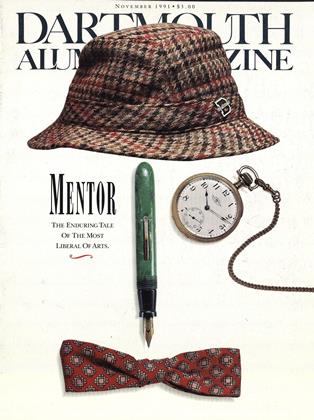HOW A BAND GOT ITS START IN A DARTMOUTH COURSE.
Every summer since they graduated in 1983, Tom McKean, Kelley Bishop, Rick Gagne, and Carrick Eggleston have been getting together "one last time" to go on the road and play Irish and Scottish music throughout New England and New York State. But as they went on tour for the month of July, they stopped talking about a last time.
The first time was ten years ago, thanks to the D Plan. In the summer of 1981 friends Kelley, Rick, and Tom took a seminar on Irish, Scottish, and American folk music. Particularly enamored of the Celtic (Irish and Scottish) music they had studied, the three formed a band; Carrick joined later. The ballads, jigs, reels, and marches they now perform feature such instruments as fiddle, accordion, bouzouki, guitar, cittern, banjo, and bodhran (an Irish drum). When the group started touring during their junior year it adopted the name DunCreagan, which in Gaelic means "fortress of the crags." Explains Kelley, "We just thought it sounded cool."
Since then, they have pursued their own careers in folk. Carrick, who is pursuing a doctorate in physics at Stanford, plays in a band he started called Knotwork; Kelley, the recruiting coordinator at Dartmouth's Career and Employment Services, plays with Deacon's Close in Hanover. Rick is working toward a Ph.D. in folklore at the University of Indiana, and Tom is studying folklore in the department of Celtic at the University of Edinburgh's School of Scottish Studies. Summers are free for touring, and they all keep in touch through the academic community's international electronic-mail system.
DunCreagan's 10th reunion tour ranged from New York City to Maine and included a gig at Moosilauke Ravine Lodge. Future job and family commitments may make touring a bit difficult, but Rick is optimistic: "The scariest thought is, what happens when some of us suddenly have kids? Then I realize that's fine—they're potential band members."
DimCreagan "adapts traditional Irish and Scottishmusic for American ears., "says Rick Gagne, "but withstrong respect far its sources."
 View Full Issue
View Full Issue
More From This Issue
-
 Feature
FeatureC. Everett Koop '37 on Ray Nash
November 1991 By Ray Nash -
 Feature
FeatureJerry Zaks '67 on Warner Bentley
November 1991 By Warner Bentley -
 Feature
FeatureSusan Dentzer '77 on James Cox
November 1991 By Jim Cox -
 Feature
FeatureLouise Erdrich '76 on Brenda Silver
November 1991 By Brenda Silver -
 Feature
FeatureJohn Turkevich '28 on Leon Richardson
November 1991 By Leon Richardson -
 Feature
FeatureMarshall T. Meyer '52 on T.S.K. Scott-Craig
November 1991 By T.S.K. Scott-Craig
Heather Killebrew '89
-
 Article
ArticleSteering a Mid-Life Course Change
APRIL 1990 By Heather Killebrew '89 -
 Article
ArticleA Historic Gift
SEPTEMBER 1991 By Heather Killebrew '89 -
 Article
ArticleA Keeper of Sheep, by William Carpenter '62
April 1995 By Heather Killebrew '89 -
 Article
ArticleScience Posters Make Me Sweat
September 1995 By Heather Killebrew '89 -
 Article
ArticleCall Me Elvis
December 1995 By Heather Killebrew '89 -
 Article
ArticleDartmouth OuT O' DOORS
MAY 1997 By Heather Killebrew '89







